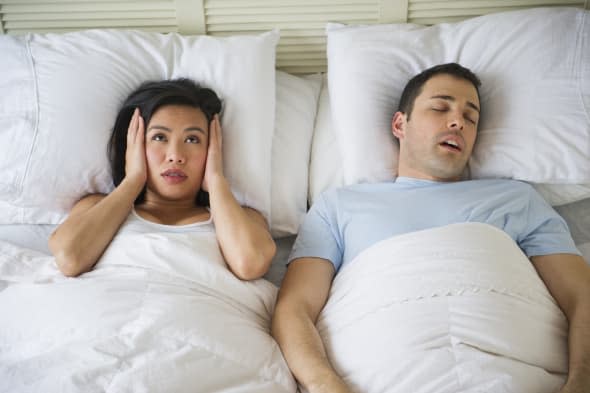Tips to stop snoring

Is your other half's snoring driving you to distraction - or the spare room? It's estimated that 40% of adults in the country snore. The noise isn't just a problem for sleepless partners. Snoring, and the more serious condition of sleep apnoea, can cause serious health problems for the sufferer too.
Related Searches
Why do we snore?
Most of us now what snoring sounds like, but what causes it? When we're awake, we have sufficient muscle tone to keep our airway open. When we sleep, we lose muscle tone and the tongue, throat and roof of the mouth relax, causing the loose tissue in the throat to sag, which narrows the airways. Snoring is a result of soft tissue in the air passages vibrating – and the narrower the airways become, the greater the vibration and the louder the snoring. While this reduction of breathing space is not a problem for most of us, for some it results in snoring. For others, an obstruction somewhere between the Adam's-apple and the tip of the nose, which could be a swollen tissue, congestion or a deformity, causes the problem.
%VIRTUAL-AFCSponserAds%Are you likely to snore?
Men are twice as likely to snore as women, and you're more likely to suffer the older you are - 58% of snorers are aged between 50-59 years old. People who are obese, particularly those who have a collar size of 16 ½" or above, and who smoke or drink are also more likely to have problems. There can be other factors at play too, such as your cross bite, a blocked nose caused by allergies or a twisted septum; a small jaw, which means the tongue is squashed and tends to fall backwards during sleep; a longer than normal avula, the little piece of flesh that hangs down from the rear portion of the soft palate and even the size of your tonsils.
Sleep apnoea
Obstructive sleep apnoea occurs when a person stops breathing for 10 seconds or more between very loud snores, more than 10 times per hour. These pauses in breathing or 'apnoeas' happen when the airways narrow or close completely, depriving the lungs of oxygen. When the brain detects dangerously low levels of oxygen in the body, it wakes the sufferer, so they can return to normal breathing. Many people who have sleep apnoea aren't aware of the problem – the only indication may be tiredness during the day, or when a partner tells them. People who suffer with sleep apnoea are at increased risk of stroke, cardiovascular disease and hypertension - so make an appointment to see your GP if you think there may be a problem.
Treatment options
The best snoring treatment for you will depend on what's causing the problem. Treatment options range from straps to hold your chin in place (if your mouth tends to drop open at night) and nasal strips to keep your airways open, to devices you wear while sleeping. If you are a 'tongue base snorer' a Mandibular Advancement Device that you wear in your mouth while sleeping will hold the lower jaw and tongue forward making more space to breathe and prevent snoring.
If you've tried other treatments without success or suffer from sleep apnoea, you may want to try a CPAP machine. Standing for "continuous positive airway pressure", these devices are worn over the face and adjust the pressure of air for you throughout the night. The machine is able to sense snoring sounds and apnoeas and will increase the pressure to counteract them. They machines, which cost from £300 to £750, are quiet to run and are considered the most effective treatment for apnoea sufferers.
Surgical options
If you've tried all other options, surgery for snoring may be considered as a last resort. You're unlikely to get the procedure done on the NHS unless you can prove that snoring is having an adverse effect on your health or quality of life, and you've tried all other recommended treatments without success. However, surgery is not suitable for most cases of snoring - for example, it has limited effectiveness in treating nasal snoring and is not recommended for people with sleep apnoea.
There are operations you can pay for privately, most of which aim to stop the area around the throat collapsing when you sleep. This is usually done by reducing the amount of soft palate and/or removing the tonsils. Before considering surgery, it's worth trying every treatment option available. Devices like mouth guards and CPAP machines may take some getting used to but prove effective for thousands of people every year. Before you go under the knife, it's also worth making the recommended lifestyle changes (ie drinking less alcohol, giving up smoking and losing weight if you're overweight) to see if it makes a difference.
Have you found a cure for your snoring? Leave a comment below...




